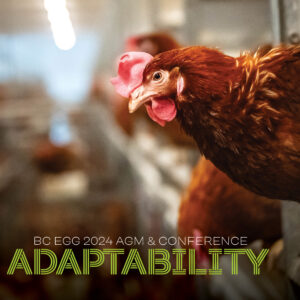Think Eggs
Eggnog Christmas Countdown
This year we’re celebrating the season with a collection of recipes showcasing our favourite holiday beverage: eggnog! We’ve got over…
At BC Egg, we appreciate that you have concerns regarding the recent Avian Influenza outbreak in the Fraser Valley and we want to provide with some facts to assure you and alleviate some of your concerns.
You may have heard about the recent avian influenza outbreak in British Colombia, and because of this you may have questions. In short, here’s what you need to know:
Now, let’s get into some more detail with some Qs and As we’ve heard from you. Got another question? Contact us at info@eggs.ca.
Avian influenza, or AI for short, is a viral infection that can affect all birds, not just poultry. Some wild birds carry influenza viruses without becoming ill due to a natural resistance. Wild waterfowl is seen as a primary source for the possible introduction of infection into domestic poultry.
Signs of the disease in domestic poultry range from a mild infection with no symptoms to a severe epidemic that kills the majority of the infected flock.
Avian influenza viruses are classified into two categories: low pathogenic and highly pathogenic forms based on the severity of the illness in birds. Highly pathogenic forms cause the greatest number of deaths in birds.
To date, the H5 and H7 forms of avian influenza are the only strains that have demonstrated the ability to be either low or high pathogenic. Remember, pathogenicity (either high or low path) refers to how contagious the virus is among birds, not humans. The transfer of avian influenza to humans is very rare. Again, this is an animal health issue, not a human health issue.
When avian influenza is identified, scientists use a specific system to tell them what kind of flu they’re dealing with. They identify them using a series of H’s and N’s (e.g. H5N1, H5N2, H7N1, etc.). Once a farmer notices symptoms in the flock, a veterinarian is called to investigate further. The following steps are then taken:
Once all those details are ironed out, scientists know exactly what they’re dealing with.
Usually, what happens next is that specific zones are set up, and these zones have strict movement controls in place, which limit the opportunities of spread from the factors we can control.
In most cases, infection is caused by contact with wild birds, especially waterfowl which may transmit the disease and not yet show symptoms. Other common methods of transmission include:
Egg and poultry farmers are doing a great deal to ensure that avian flu does not spread.
While the risk of spreading always exists, farmers and farm staff practice strict biosecurity protocols to safeguard Canada’s food supply and defend against diseases that risk the health of the bird, like avian influenza.
Biosecurity measures are enforced on the farms at all times—not only during an outbreak. Proper procedures can slow the spread of the virus, helping the Canadian Food Inspection Agency contain and stamp out the disease. This serves as one of our best measures of protection.
Across the country, regulated egg farmers work with the Canadian Food Inspection Agency, and follow a comprehensive on-farm food safety program called Start Clean-Stay Clean™. The program includes everything from on-farm inspections, to mandated standards for storage, cleanliness, air quality, feed and record keeping. For example:
The Canadian egg industry is watching this situation extremely closely and is working with the B.C. Egg Marketing Board, as well as other national poultry organizations to assess the situation on a daily basis.
The group speaks almost daily with the Canadian Food Inspection Agency and with Health Canada to ensure that everyone has the most recent information towards the outbreak. Our provincial boards, federal government partners, provincial governments and our stakeholders stay in constant communication to ensure that everyone remains informed.
Egg Farmers of Canada is also working with all regulated egg farmers in Canada, so that they can continue to provide safe eggs to Canadians.
Yes. Euthanizing the affected birds is an important step in eradicating the virus and preventing spread. The Canadian Food Inspection Agency works with the provincial governments of the affected region to humanely euthanize infected flocks and monitor nearby flocks for signs and symptoms.
The transfer of avian influenza to humans is very rare. There are no instances of people becoming ill so far in B.C. Careful surveillance and testing is done on workers and industry staff during the outbreak. No illness has been reported from this outbreak.
During the avian influenza outbreak in British Columbia in 2004, only two cases of human illness occurred and those were mild eye conjunctivitis that went away after a few days. No other human cases were found.
Cases of avian influenza have been reported in North America before. In Canada, a large outbreak occurred in 2004 in B.C., and subsequent cases in 2008, 2009 and 2010. In each case, there has been no human health risk.
Canada has world class standards of on-farm food safety and biosecurity. Because of this, the Canadian Food Inspection Agency was able to contain and eradicate each outbreak.
Yes. Both Health Canada and the World Health Organization say that you can safely eat properly cooked and handled eggs. Avian influenza has never been passed on to humans as the result of eating eggs or poultry meat, like chicken or turkey.
Food safety is a year-round concern and all the food we eat should be treated with proper care and handling. At home, exercise the same diligence with your eggs as you always have.
Got more questions? Let us know. Email our team at info@eggs.ca with your question. We would be happy to answer your questions, or help you find someone who can. You can also check the Canadian Food Inspection Agency’s avian influenza website right here.

This year we’re celebrating the season with a collection of recipes showcasing our favourite holiday beverage: eggnog! We’ve got over…

BC Egg is hosting our 2024 AGM and Conference at the Fairmont Hotel Vancouver. Will you be joining us?

Celebrate World Egg Day with eggs ANY time!